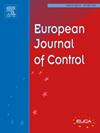Recursive identification of structured systems: An instrumental-variable approach applied to mechanical systems
IF 2.6
3区 计算机科学
Q2 AUTOMATION & CONTROL SYSTEMS
引用次数: 0
Abstract
Online system identification algorithms are widely used for monitoring, diagnostics and control by continuously adapting to time-varying dynamics. Typically, these algorithms consider a model structure that lacks parsimony and offers limited physical interpretability. The objective of this paper is to develop a real-time parameter estimation algorithm aimed at identifying time-varying dynamics within an interpretable model structure. An additive model structure is adopted for this purpose, which offers enhanced parsimony and is shown to be particularly suitable for mechanical systems. The proposed approach integrates the recursive simplified refined instrumental variable method with block-coordinate descent to minimize an exponentially-weighted output error cost function. This novel recursive identification method delivers parametric continuous-time additive models and is applicable in both open-loop and closed-loop controlled systems. Its efficacy is shown using numerical simulations and is further validated using experimental data to detect the time-varying resonance dynamics of a flexible beam system. These results demonstrate the effectiveness of the proposed approach for online and interpretable estimation for advanced monitoring and control applications.
结构化系统的递归辨识:一种应用于机械系统的工具变量方法
在线系统辨识算法通过不断适应时变动态特性,广泛应用于监测、诊断和控制等领域。通常,这些算法考虑的模型结构缺乏简约性,并且提供有限的物理可解释性。本文的目的是开发一种实时参数估计算法,旨在识别可解释模型结构中的时变动力学。为此采用了一种附加模型结构,它提供了增强的简约性,并被证明特别适用于机械系统。该方法将递归简化精细工具变量法与块坐标下降法相结合,以最小化指数加权输出误差代价函数。这种递归辨识方法可提供参数化连续时间加性模型,适用于开环和闭环控制系统。数值模拟表明了该方法的有效性,并用实验数据进一步验证了柔性梁系统时变共振动力学的有效性。这些结果证明了所提出的方法对高级监测和控制应用的在线和可解释估计的有效性。
本文章由计算机程序翻译,如有差异,请以英文原文为准。
求助全文
约1分钟内获得全文
求助全文
来源期刊

European Journal of Control
工程技术-自动化与控制系统
CiteScore
5.80
自引率
5.90%
发文量
131
审稿时长
1 months
期刊介绍:
The European Control Association (EUCA) has among its objectives to promote the development of the discipline. Apart from the European Control Conferences, the European Journal of Control is the Association''s main channel for the dissemination of important contributions in the field.
The aim of the Journal is to publish high quality papers on the theory and practice of control and systems engineering.
The scope of the Journal will be wide and cover all aspects of the discipline including methodologies, techniques and applications.
Research in control and systems engineering is necessary to develop new concepts and tools which enhance our understanding and improve our ability to design and implement high performance control systems. Submitted papers should stress the practical motivations and relevance of their results.
The design and implementation of a successful control system requires the use of a range of techniques:
Modelling
Robustness Analysis
Identification
Optimization
Control Law Design
Numerical analysis
Fault Detection, and so on.
 求助内容:
求助内容: 应助结果提醒方式:
应助结果提醒方式:


